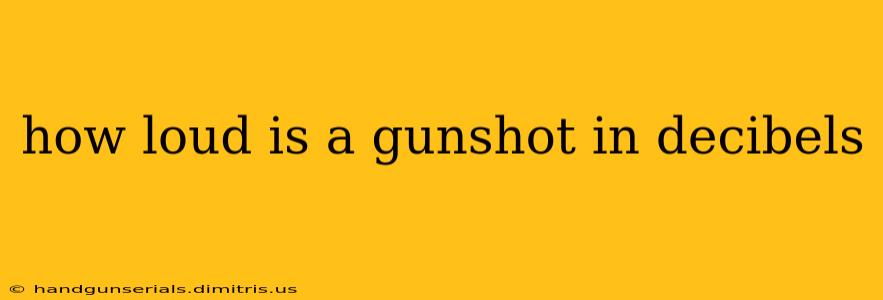How Loud is a Gunshot in Decibels? The Shocking Truth About Firearm Noise
The question, "How loud is a gunshot in decibels?" doesn't have a single, simple answer. The sound level of a gunshot varies dramatically depending on several factors. Understanding these variations is crucial, not only for appreciating the potential for hearing damage but also for understanding the broader impact of firearm noise on public health and safety.
Factors Affecting Gunshot Loudness
Several key variables significantly influence the decibel level of a gunshot:
-
Type of Firearm: A small caliber pistol will produce a considerably lower decibel reading than a high-powered rifle. The ammunition used also plays a significant role; larger, more powerful rounds generate louder sounds.
-
Ammunition Type: Different types of ammunition, even within the same caliber, can produce varying noise levels. The composition of the propellant and the bullet's design influence the intensity of the explosion and subsequent sound wave.
-
Distance from the Muzzle: The closer you are to the firearm when it's discharged, the higher the decibel level you'll experience. Sound intensity decreases rapidly with distance.
-
Surroundings: The environment plays a role. A gunshot fired in an open field will have different sound characteristics compared to one fired indoors or in a confined space. Open spaces allow sound waves to dissipate more readily, while enclosed areas create echoes and reverberations, potentially increasing the perceived loudness.
-
Muzzle Device: The presence of a suppressor (often mistakenly called a silencer) significantly reduces the noise of a gunshot, but it doesn't eliminate it entirely. Even with a suppressor, the sound is still extremely loud, although it's considerably quieter than an unsuppressed firearm.
Decibel Ranges and Hearing Damage
While a precise decibel figure is impossible to give without specifying the above factors, it's safe to say that gunshots consistently exceed levels known to cause immediate and long-term hearing damage. Estimates range from 140 to 175 decibels, placing them well above the threshold for immediate hearing damage (generally considered to be around 140 dB). Exposure to such high decibel levels, even for a short duration, can lead to:
-
Temporary Threshold Shift (TTS): Temporary hearing loss that usually recovers within hours or days.
-
Permanent Threshold Shift (PTS): Permanent hearing loss that is irreversible. This can range from mild tinnitus (ringing in the ears) to significant hearing impairment.
-
Acoustic Trauma: Severe damage to the inner ear, potentially causing significant and permanent hearing loss.
The Importance of Hearing Protection
Given the potentially devastating effects of firearm noise on hearing, the use of appropriate hearing protection is paramount. This includes:
-
Hearing Protection Ratings (NRR): Understand the Noise Reduction Rating (NRR) of hearing protection to select appropriately rated gear for the expected noise levels.
-
Earmuffs and Earplugs: Consider using both earmuffs and earplugs for maximum protection, as they offer different levels of noise reduction across various frequencies.
-
Consistent Use: Always wear hearing protection when handling firearms, regardless of the firearm type or ammunition used.
Conclusion: Gunshot Noise is a Serious Issue
The loudness of a gunshot in decibels is a critical consideration for anyone who handles firearms. Understanding the factors that influence this loudness and the severe potential for hearing damage underscores the critical importance of consistent and appropriate hearing protection. The impact extends beyond individual hearing health, encompassing public safety and environmental noise pollution concerns. Responsible firearm handling necessitates a commitment to hearing safety.

